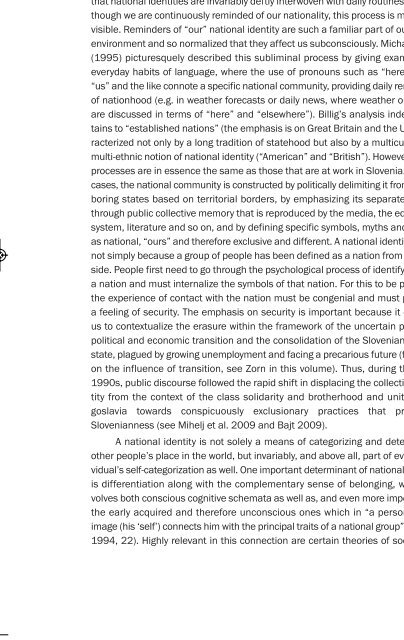The Scars of the Erasure_web
The Scars of the Erasure_web
The Scars of the Erasure_web
- No tags were found...
Create successful ePaper yourself
Turn your PDF publications into a flip-book with our unique Google optimized e-Paper software.
<strong>Erasure</strong>_4a 10.1.11 20:29 Page 208208 THE SCARS OF THE ERASURE4.1 <strong>The</strong> significance <strong>of</strong> national identityTo be able to understand <strong>the</strong> erasure and <strong>the</strong> long absence <strong>of</strong> noteworthypublic indignation at what happened to <strong>the</strong> erased people, it is important to knowthat national identities are invariably deftly interwoven with daily routines, and althoughwe are continuously reminded <strong>of</strong> our nationality, this process is mainly invisible.Reminders <strong>of</strong> “our” national identity are such a familiar part <strong>of</strong> our socialenvironment and so normalized that <strong>the</strong>y affect us subconsciously. Michael Billig(1995) picturesquely described this subliminal process by giving examples <strong>of</strong>everyday habits <strong>of</strong> language, where <strong>the</strong> use <strong>of</strong> pronouns such as “here,” “we,”“us” and <strong>the</strong> like connote a specific national community, providing daily reminders<strong>of</strong> nationhood (e.g. in wea<strong>the</strong>r forecasts or daily news, where wea<strong>the</strong>r or eventsare discussed in terms <strong>of</strong> “here” and “elsewhere”). Billig’s analysis indeed pertainsto “established nations” (<strong>the</strong> emphasis is on Great Britain and <strong>the</strong> US), cha -racterized not only by a long tradition <strong>of</strong> statehood but also by a multicultural ormulti-ethnic notion <strong>of</strong> national identity (“American” and “British”). However, <strong>the</strong>seprocesses are in essence <strong>the</strong> same as those that are at work in Slovenia. In bothcases, <strong>the</strong> national community is constructed by politically delimiting it from neighboringstates based on territorial borders, by emphasizing its separate historythrough public collective memory that is reproduced by <strong>the</strong> media, <strong>the</strong> educationsystem, literature and so on, and by defining specific symbols, myths and valuesas national, “ours” and <strong>the</strong>refore exclusive and different. A national identity existsnot simply because a group <strong>of</strong> people has been defined as a nation from <strong>the</strong> outside.People first need to go through <strong>the</strong> psychological process <strong>of</strong> identifying witha nation and must internalize <strong>the</strong> symbols <strong>of</strong> that nation. For this to be possible,<strong>the</strong> experience <strong>of</strong> contact with <strong>the</strong> nation must be congenial and must producea feeling <strong>of</strong> security. <strong>The</strong> emphasis on security is important because it enablesus to contextualize <strong>the</strong> erasure within <strong>the</strong> framework <strong>of</strong> <strong>the</strong> uncertain period <strong>of</strong>political and economic transition and <strong>the</strong> consolidation <strong>of</strong> <strong>the</strong> Slovenian nationstate,plagued by growing unemployment and facing a precarious future (for moreon <strong>the</strong> influence <strong>of</strong> transition, see Zorn in this volume). Thus, during <strong>the</strong> early1990s, public discourse followed <strong>the</strong> rapid shift in displacing <strong>the</strong> collective identityfrom <strong>the</strong> context <strong>of</strong> <strong>the</strong> class solidarity and bro<strong>the</strong>rhood and unity <strong>of</strong> Yugoslaviatowards conspicuously exclusionary practices that promotedSlovenianness (see Mihelj et al. 2009 and Bajt 2009).A national identity is not solely a means <strong>of</strong> categorizing and determiningo<strong>the</strong>r people’s place in <strong>the</strong> world, but invariably, and above all, part <strong>of</strong> every individual’sself-categorization as well. One important determinant <strong>of</strong> national identityis differentiation along with <strong>the</strong> complementary sense <strong>of</strong> belonging, which involvesboth conscious cognitive schemata as well as, and even more importantly,<strong>the</strong> early acquired and <strong>the</strong>refore unconscious ones which in “a person’s selfimage(his ‘self’) connects him with <strong>the</strong> principal traits <strong>of</strong> a national group” (Musek1994, 22). Highly relevant in this connection are certain <strong>the</strong>ories <strong>of</strong> social psy-


